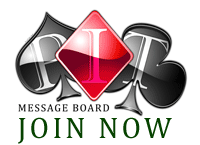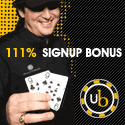 Many online poker players watched with great interest when the House Financial Services committee held a hearing on March. 3 to discuss the merits and obstacles of a federally regulated online poker system. But when the hearing concluded without a vote, many people wondered, "What's next?"
Many online poker players watched with great interest when the House Financial Services committee held a hearing on March. 3 to discuss the merits and obstacles of a federally regulated online poker system. But when the hearing concluded without a vote, many people wondered, "What's next?"
The most likely answer has always been a congressional mark-up, where the bill is read aloud and members of the corresponding committee can voice their concerns and edits. But it has been unclear as exactly to when that mark-up would occur.
But it appears that date could be on the horizon. Poker Players Alliance Executive Director John Pappas told Card Player that a mark-up on Frank's poker bill could happen as soon as this month "if the stars align," and that he was "optimistic" that a mark-up would happen by the spring.
In an exhaustive interview, Pappas discusses what the PPA has been doing in recent months in preparation for a committee vote, the importance of getting Harry Reid's support for online poker, and a host of other issues. Part 2 of the interview will be posted on Saturday.
Stephen A. Murphy: What has happened since that March. 3 hearing in regards to Barney Frank's bill?
 John Pappas: There's been a lot of work behind the scenes with the PPA and others to kind of solidify support in the committee for the proposal. We're also seeking compromises where necessary; maybe we'll earn some more votes from committee members who maybe oppose the bill in its current form, but would support it with some changes to it. Those often center around enforcement, like you see in the Menendez bill, some additional measures to protect minors from accessing web sites, things along those lines.
John Pappas: There's been a lot of work behind the scenes with the PPA and others to kind of solidify support in the committee for the proposal. We're also seeking compromises where necessary; maybe we'll earn some more votes from committee members who maybe oppose the bill in its current form, but would support it with some changes to it. Those often center around enforcement, like you see in the Menendez bill, some additional measures to protect minors from accessing web sites, things along those lines.
We've been in a number of discussions and I think Mr. Frank has a few more issues that he's working out himself, and we hope he will stick to his deal to mark this bill up sometime in the spring.
SM: How important is the house financial services committee vote?
JP: Well, it's a huge committee, with over 70 people on it. I think the vote in the committee is kind of the bellwether. Based on that vote in the committee, if it's overwhelmingly in favor of the bill or if it's a narrowly passed bill, it'll kind of chart our course. We all must be aware that the Senate could act independently on this as well. We'd certainly work with Senate offices if they choose to do so.
SM: Could there be a second hearing in the committee without a markup?
JP: I don't think you'll see a second hearing unless Chairman Frank wants to do a hearing on the UIGEA regulations, which are set to come out on June 1. I think the next step would be a mark-up; I think it's just a matter of when Chairman Frank will be able to schedule that. We still remain optimistic that it will still be sometime this spring; it could be as early as the end of this month if the stars align, but I don't know if Mr. Frank is there yet.
SM: How many co-sponsors does Barney Frank's bill have now, and how has that changed in recent months?
JP: I think it has 66 or 67 co-sponsors now. There may be a few names of people who have announced their intention to co-sponsor, but haven't been added to the official list yet. I think it's probably gone up four or five co-sponsors since the March hearing, not significantly. But the hearing was obviously limited to those members of the committee.
SM: The PPA has been very active in talking to many state legislatures about regulation recently. Tell me some of the specific things you've done in D.C. and at the federal level since March?
JP: It's really been on the ground. CPAC was obviously a big success. It helped educate other audiences. We're doing outreach like that regularly. But for the most part, we've focused on specific members of the committee, talking with them to see how we can get them in the position to support the chairman's bill.
SM: Besides Barney Frank (D-MA), who are the major advocates for poker on Capitol Hill?
JP: Obviously, Senator Menendez (D-NJ). A lot of supporters of Chairman Frank's bill have been strong supporters from the get-go, people like Steve Cohen (D-TN) and Ed Perlmutter (D-CO). If you want to identify a champion, Barney Frank is the champion because he is the author of the bill and chairman of the committee of jurisdiction. I don't think anyone is going to try to take the mantle from him, nor would it be appropriate from them to do so. Congressman McDermott (D-WA) is another; he's the sponsor of the tax bill. Shelley Berkley (D-NV), as well as other members of the Nevada delegation, has been very supportive.
We continue to work with Senator Reid (D-NV) to educate him on it, and I think his position is evolving in terms of internet poker.
SM: Talk about the importance of getting Harry Reid's support. He sent a letter supporting a delay for the UIGEA, but he hasn't come out with an official position on online poker regulation, correct?
JP: He has not. I can't underscore how important his position is on all of this because I would suspect that the White House looks to Senator Reid for a number of issues, but most significantly for gaming issues. He is the majority leader, and he represents the largest gaming state in the country. I think a lot of people will view his opinion as kind of gospel when it comes to this, so we're hopeful that he comes — and I think he is — that he comes to the right conclusions about internet poker and the need for a federal license.
SM: There's obviously a ton of poker players who live in Nevada, and Senator Reid is facing what is expected to be a tough reelection campaign this March. What do you say to poker players who are hesitant to vote for him because he hasn't come out strongly in support of online poker regulation?
JP: Well, there's a lot of time between now and March. 2. We hope that there is a definitive measure of support from the senator by that time, and I think that he did send the letter to the regulators, supporting the delay, is something that poker players can feel very good about. To be quite honest, I think that letter had a lot to do with the support of the petition. I think he has shown the poker community that he's interested and that he's open to the idea. We just need to get him all the way there.
And from the PPA's perspective, we need to continue to remind our members that they should weigh in with Senator Reid. He's going to be at home a lot over the next several months, campaigning. They need to seek him out and ask him about this issue along with all the other national priorities our country is dealing with, like healthcare, jobs, and the economy.
SM: Senator Menendez's bill still doesn't have any co-sponsors. Has that bill sort of fallen to the backburner a bit as you guys concentrate on Barney Frank's bill?
JP: No, it hasn't fallen on our backburner at all. We remain committed to trying to advance that bill, but the Senate works a little differently than the House. The House works on the system of getting a bill introduced, getting co-sponsors, having a hearing, having a mark-up, having a vote. The Senate works under its own special procedures. Respecting that and understanding that, we're going through the appropriate steps to make sure that when the time is right, Mr. Menendez's bill will be available.
As I mentioned before, one of the important things that we need to do is make sure we have folks like Harry Reid on board before you start pushing something in his chamber. He is the majority leader, and he can very much stop something, and we don't want to push him into a position where he is stopping something. We'd rather first work to get him on board.
We have a very different position on the House side where the chairman of the committee is actually the author of the bill. We have a lot more flexibility to demonstrate momentum on that bill than we do on the Senate side.
Part 2 of the interview will be published on Saturday, March 13. In it, Pappas will discuss the new (and approaching) UIGEA deadline and the possibility of state legislatures leapfrogging the federal movement to regulate online poker.
 Bart Hanson (pictured right) is an accomplished cash-game player and poker commentator who has lent his voice to such projects as Cash Plays,Live at the Bike, and Deuce Plays.
Bart Hanson (pictured right) is an accomplished cash-game player and poker commentator who has lent his voice to such projects as Cash Plays,Live at the Bike, and Deuce Plays.











